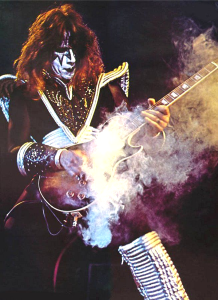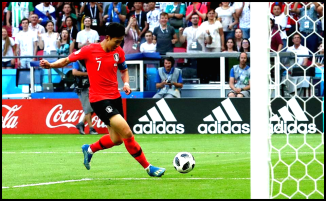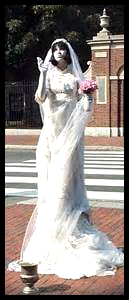Being alone was one of the bitterest disappointments of my young life. People made fun of my stilted manner, my pedantic speech, and my detachment from other people.
I walked through the scenes of my life like an outside observer, stepping carefully over the rubble and staying out of trouble. There was very little happiness in my world. Luckily, I had a natural gift for understanding machines and making things work. But people were a complete mystery to me.
– Switched On: A Memoir of Brain Change and Emotional Awakening

Smoking Guitar John E. Robison Designed for KISS. Pinterest.
You may have brought John Elder Robison into your home in the 70s if you watched TV or played with an electronic toy. His was the brilliant mind behind the guitars that breathed fire and launched rockets and drove the KISS fans wild from the stage. The sound equipment he built for Pink Floyd’s sound company played before millions across North America. But he left the world of rock and roll thinking himself a fraud and failure, unable to see his value in the social fabric because he couldn’t read social cues. John didn’t know he was successful because he didn’t feel successful. So he moved into the corporate world, engineering electronic toys and games for Milton Bradley until he climbed the ladder where at the peak he found himself managing engineers, and social skills became more important than technical expertise. Although he remained troubled by people’s response to the differences that were evident in him, John didn’t know he was autistic for 40 years until he picked up Asperger’s Syndrome by Tony Attwood. Nor does he consider himself a genius, but Malcolm Gladwell will disagree because by the time John was 20 years old, he had spent well over 10,000 hours studying music and taking apart electronics, beginning with repair and eventually creating circuits of his own design. John made full use of the laser focus and prodigious capacity for knowledge that was characteristic of Aspergians alongside his commitment to hard work to carve for himself a fulfilling life. His first book, New York Times bestseller Look Me in the Eye, opens the door into the mind of autistic children and those who seem disconnected from the world. I was deeply touched by the testimony that takes us past the struggles of the autistic to the hopes of connection and belonging that embody the human spirit. Our celebrated guest, who has appeared on the Today Show and given countless interviews and talks throughout the country, has graciously taken the time to share some of his discoveries and triumphs with us.
Can you take us through the various points of your journey where you successfully applied your gifts in the face of obstacles?
With a drunk, violent father and a mother who was often manic and sometimes out-and-out crazy, my home life was chaotic and unpleasant. Teachers sometimes saw flashes of exceptionality in me, but that was overshadowed by the many deficiencies kids and adults loved to point out. With no support at school, I dropped out at 15 by which point my parents were in states of collapse, both of them having been committed to the state hospital numerous times.
There were no disability supports for kids back then, at least ones like me. I still managed to have a lot of fun as an emergent adult, playing music, riding my motorcycle, and tinkering with cars and machines. Musicians and car enthusiasts welcomed me because I could do things they valued. Knowing my social limitations, I realized I would never be the guy on stage playing the guitar or the driver racing a rally car to victory. But I could be the guy behind the scenes with the technical skills to help make those things happen. I also became good at fixing cars and between those things, I made enough money to get my own apartment.
I am really lucky to have the ability to fix and create things that others value. Repairing a car or a broken electronic device is a skill that is useful everywhere. Creating stories also has universal value. At first, I wrote reports and proposals for clients. Then I wrote articles in car magazines. After learning about my autism, I decided to write a book and then wrote three more. Now I am back to writing car articles and stories on neurodiversity while running a business that restores, sells, and services high-end cars.
My parents had their share of problems, but despite alcoholism and mental illness they were both successful teachers. I think they would be proud to see that I’ve followed in their footsteps. I enjoy learning and sharing my ideas as the neurodiversity scholar at William and Mary and the neurodiversity advisor for Landmark College. I get to speak on autism and neurodiversity at other colleges every year. As my father did as a professor of philosophy, I grapple with difficult ethical issues in various settings like government autism committees.
Creating pictures, also something I enjoy, too has helped me find success. I earned the down payment on the garage complex of my car company from concert and carnival photo royalties. Today I am proud to see hundreds of musicians and circus performers using my images, which have been widely published, from the pages of the Wall Street Journal to billboards along the highway.

Patch.com
What compelled you to reach for success over against your difficult upbringing and social disability?
Looking back at what I’ve achieved, I guess one thing is how important it was to me that I produce good work. The absence of security in my childhood also gave me a very strong drive to make it. I made myself successful as I learned how to minimize my disabilities to the point of acceptability and how to build up my gifts and find people like those musicians who could appreciate what I could do and whose minds were flexible enough to excuse what I couldn’t do.
I believe knowledge of autism at an earlier age would have changed the course of my life. Without the understanding of what made me different, I grew up thinking I was a second-rate human being. Today, with a large number of extremely successful clients in the auto restoration field, I look at myself and them and see how much social disability had held me back. At the same time, I see how far logic, reasoning power, and technical skill have brought me. These things gave me a strong desire to prove I was good and drove me to my various accomplishments.
You’ve cited studies that measured the internal physiological response of autistic people in the face of emotional prompts like watching someone get poked or hurt. Turns out autistic people sustain a stronger response of empathy than nonautistic folks for longer, at that. Could you talk about autistic people’s capacity to love?
Autistic people have the same capacity for love or any other emotion as anyone else. We just don’t always show our emotions in the expected ways, or to the expected degrees. And our emotional responses may not be the same as those of a person who is not autistic for a given triggering event.
How did you manage discouragement?
I just kept working. I failed at things, lost jobs, made and lost friends, but through it all I just kept going because I had no other choice. The weight of that mantle of sadness was very heavy for a long, long time. It’s much less so today. I have always wrestled with anxiety and depression.
Who inspired you in your journey?
In whatever field I worked there were always older engineers and technicians who seemed to be better at everything I could do. They challenged me to improve my skills. Looking back, I am not so sure they could actually do everything better than me, but being older they certainly possessed more wisdom and experience, and many had families and lives outside work, which I hoped to have one day (and eventually did).
For the longest time I internalized my failure in school and saw myself as just a high school dropout, an uneducated failure. I wish I had models who succeeded outside the mainstream but self-educated people are rare today, although they were quite common before the rise of “big education” in the 20th century.
I may look and act pretty strange at times, but deep down I just want to be loved and understood for who and what I am. I want to be accepted as part of society, not an outcast or outsider. I don’t want to be a genius or a freak or something on display. I wish for empathy and compassion from those around me, and I appreciate sincerity, clarity, and logicality in other people.
– Look Me in the Eye




